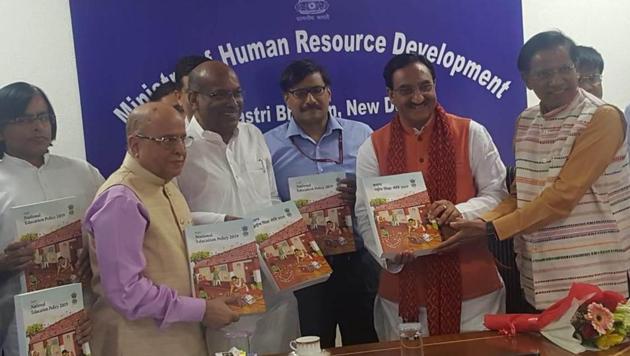Anger in South over draft policy’s Hindi ideas
Although the ruling All India Anna Dravida Munnetra Kazhagam (AIADMK), an ally of the Bharatiya Janata Party, was muted in its response, the Tamil Nadu government maintained that the state will persist with a two-language formula – Tamil and English.
In Tamil Nadu, where language is an extremely sensitive issue and an old slogan, “English Ever, Hindi Never,” still holds resonance, the draft national policy on education has incensed political parties by calling for the adoption of a three-language formula in schools — Hindi, English and the local mother tongue in non-Hindi states.

Parties of every political shade — from the opposition Dravida Munnetra Kazhagam (DMK) to the Left and actor Kamal Haasan’s fledgeling Makkal Needhi Maiam — slammed the report, which they saw as a precursor to the imposition of Hindi. Pro-Tamil parties projected it as a Dravidian versus Aryan fight.
“The DMK will never allow imposition of Hindi. It will raise its voice in Parliament and outside and strive to stall it,” DMK’s newly elected Lok Sabha MP Kanimozhi Karunandhi said.
Although the ruling All India Anna Dravida Munnetra Kazhagam (AIADMK), an ally of the Bharatiya Janata Party, was muted in its response, the Tamil Nadu government maintained that the state will persist with a two-language formula – Tamil and English.
“Tamil Nadu will continue to have the two-language formula and there is no move to either change it or dilute it,” AIADMK veteran and education minister KA Sengottaiyan said.
According to the draft National Education Policy that was made public by the new government, the three-language formula should be introduced at an earlier stage in schools.
“Since children learn languages most quickly between 2-8 years, and multilingualism has great cognitive benefits for students, children will be immersed in three languages early on, from the foundational stage,” the policy said. Suggestions of Hindi’s domination like a reference to the 54% of Indians who speak Hindi didn’t go down well in Tamil Nadu.
“In keeping with the principle of flexibility, students who wish to change one of the three languages they are studying may do so in Grade 6, so long as the study of three languages by students in the Hindi-speaking states would continue to include Hindi and English and one of the modern Indian languages from other parts of India, while the study of languages by students in the non-Hindi-speaking states would include the regional language, Hindi and English.”
In response to the outcry in Tamil Nadu, a senior human resource development ministry official said: “If anyone has any difficulty, they should express (it). We take all views into account when the policy is taken to the cabinet. 30th June is the date before which they can give views on the policy.’’
Information and broadcasting minister Prakash Javadekar wrote in a Twitter post: “There is no intention of imposing any language on anybody, we want to promote all Indian languages. It’s a draft prepared by committee, which will be decided by govt after getting public feedback “
Linguistic politics has been a feature of Tamil sub-nationalism since 1938, when protests erupted against a move by then premier of the Madras Presidency, C Rajagopalachari, to make Hindi compulsory in schools. Two men who were arrested for participating in the protests, Natarajan and Thalamuthu, and died in police custody were deified as martyrs to the cause of Tamil.
Rajagopalachari, known as Rajaji, himself became a convert and opposed the imposition of Hindi.
Massive protests erupted against Hindi again in 1965 and pro-Tamil activists committed suicide by self immolation and consuming poison. And riding on this wave of protests, the DMK rose to power in the 1967 assembly elections. No national political party has since emerged as an alternative to the Dravidian parties of Tamil Nadu.
Even now, the slogans of those days, “English Ever, Hindi Never”, “Let the body go to the grave, giving life to Tamil,” find occasional resonance.
Conscious of the political overtones of language pride in the Dravidian land, MNM founder and actor, Kamal Hassan, who has also acted in HIndi-language movies, made it clear that the language shouldn’t be imposed.
“Imposing a language is wrong. The option should be left to the people and facilities should be provided to learn any language {they want to}. Imposition would be counterproductive,” he told journalists.
Going a step further, Marumalarchi DMK (MDMK) leader Vaiko warned that Hindi imposition would lead to another language war.
“If the Centre is bent upon imposing Hindi upon us, another language war would erupt in Tamil Nadu as it happened in 1965,” he warned.
Incidentally, Tamil Nadu is the lone state in India where Navodaya Vidyalayas, residential schools meant for gifted students, haven’t been allowed on grounds that it would encourage the backdoor entry of Hindi. Both the DMK and AIADMK are on the same page on this issue.
Political parties in the state harp on late first Prime Minister Jawaharlal Nehru’s assurance that Hindi would never be imposed on non-Hindi speaking states unless they accepted the language. They also invoke a similar assurance by late Prime Minister Lal Bhadur Shastri.
“Widely spoken in the country, Hindi is one among the keys to political power at the Centre. But instead of thrusting it, the BJP government should facilitate its learning,” reasoned C Lakshmanan, associate professor at the Madras Institute of Development Studies.






